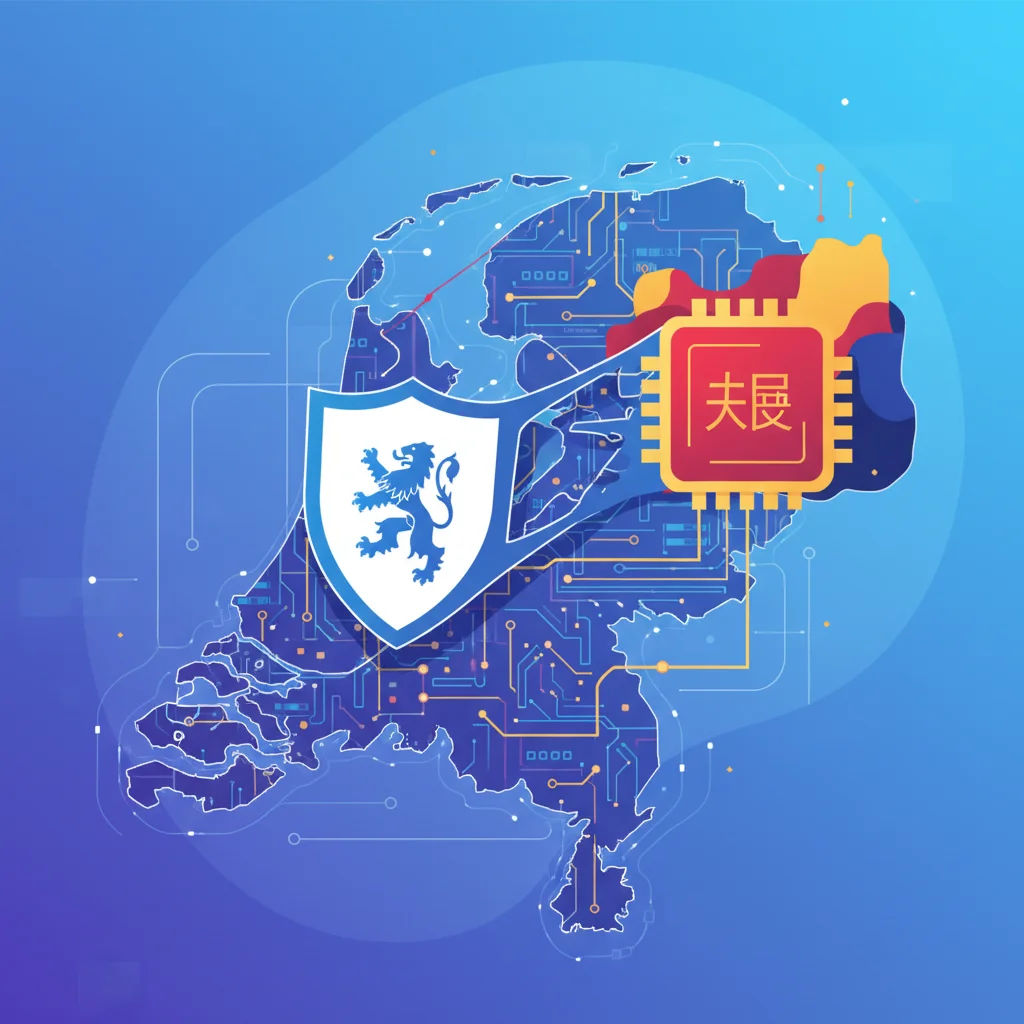
The Chip War Hits Home: Why the Netherlands Just Seized a Chinese-Owned Tech Firm
In the quiet world of low-power electronics, a battle with global ramifications is unfolding. It’s a story that involves a tiny startup, a powerful government, and the invisible yet omnipresent tug-of-war between the world’s two largest economies. The Dutch government recently made an unprecedented move, forcing the sale of Nowi, a small chipmaker, from its parent company Nexperia. The reason? Nexperia, though based in the Netherlands, is owned by a Chinese technology firm, Wingtech. This single action has sent shockwaves through the worlds of international finance, technology, and geopolitics.
This isn’t just a corporate dispute; it’s a clear signal that the global “chip war” has moved from abstract policy debates in Washington and Beijing to direct intervention in the European corporate landscape. For investors, business leaders, and anyone involved in the global economy, the Nowi case is a critical case study in a new and uncertain era of economic statecraft. It raises fundamental questions: Where is the line between protecting national security and stifling innovation and investment? And how can businesses and investors navigate a world where a deal’s success hinges as much on geopolitics as it does on financial metrics?
The Anatomy of a High-Stakes Reversal
To understand the gravity of the situation, we must first look at the players. Nowi is a Dutch startup that developed innovative “energy-harvesting” chips. These are not the hyper-advanced processors found in supercomputers or military hardware; rather, they are designed for low-power applications, enabling devices like TV remotes or electronic shelf labels to operate without traditional batteries. In 2021, Nowi was acquired by Nexperia for a modest €14 million. Nexperia itself is a major Dutch semiconductor manufacturer with deep roots in the country, spun off from the giant Philips.
The complication arises from Nexperia’s ownership. It is a subsidiary of Wingtech, a publicly-traded Chinese technology company. This ownership structure placed the acquisition of Nowi’s intellectual property under intense scrutiny. The Dutch government, leveraging a new investment screening law known as the Vifo Act, took the extraordinary step of retroactively reviewing and ultimately blocking the completed deal. The government ordered Nexperia to reverse the acquisition, citing risks to national security (source). This retroactive power is a potent tool, creating significant uncertainty for any foreign entity investing in sensitive Dutch sectors.
Nexperia has publicly argued that it is a Dutch company employing thousands in Europe and that Nowi’s technology is far from military-grade. However, the government’s concern is less about the current application and more about the potential for “dual-use” scenarios and the transfer of valuable semiconductor expertise and IP to China.
The Geopolitical Chessboard: More Than Just Microchips
The Nowi case cannot be viewed in isolation. It is a direct consequence of the escalating technological rivalry between the United States and China. The Netherlands is not a random participant; it is arguably the most critical chokepoint in the entire global semiconductor supply chain. It is home to ASML, the only company in the world capable of producing the extreme ultraviolet (EUV) lithography machines required to manufacture the most advanced microchips.
Under pressure from the U.S., the Dutch government has already implemented export controls restricting ASML from selling its most advanced equipment to China. This intervention against Nowi is another move on the same geopolitical chessboard. It reflects the adoption of the “small yard, high fence” strategy: identify a narrow set of critical technologies (the “small yard”) and protect them with robust, aggressive measures (the “high fence”).
The table below breaks down the competing arguments in this complex standoff, illustrating the clash of interests at the heart of modern international economics.
| Stakeholder | Core Argument / Position | Primary Concern |
|---|---|---|
| Nexperia / Wingtech | We are a Dutch company operating under Dutch law. The acquired technology is non-sensitive and for commercial use. | Financial loss from the forced sale, damage to reputation, and the precedent of government overreach into legitimate business. |
| The Dutch Government | The ultimate ownership by a Chinese entity poses a long-term national security risk due to potential IP transfer and dual-use applications. | Preventing sensitive technological know-how from flowing to a strategic rival, aligning with Western security interests. |
| International Investors | This action introduces significant regulatory and geopolitical risk into the Dutch and European markets. | Uncertainty in the M&A landscape, the chilling effect of retroactive deal cancellations on future foreign direct investment (FDI). |
The Ripple Effect on Finance and the Stock Market
Events like the Nowi seizure have a tangible impact that extends far beyond the companies involved, directly influencing the broader financial landscape. For investors, this introduces a potent and unpredictable variable: geopolitical risk.
Firstly, it creates a “chilling effect” on foreign direct investment, particularly in the technology sector. Potential acquirers, especially those with ties to China, will now think twice before investing in European tech startups, fearing a similar retroactive veto. This can depress valuations and limit exit opportunities for venture capitalists and early-stage investors, potentially starving innovative companies of much-needed capital.
Secondly, it forces a re-evaluation of risk within the stock market. Companies with significant cross-border supply chains or ownership structures are now viewed through a different lens. A company like Nexperia, despite being operationally European, carries a risk profile tied to Beijing’s geopolitical standing. Analysts and sophisticated financial technology (fintech) platforms must now model for scenarios like forced divestments, sanctions, and regulatory blockades, making accurate forecasting more complex than ever.
This new paradigm also affects the banking sector, which underwrites and finances major M&A deals. The legal and financial due diligence process must now include deep geopolitical analysis. A deal that looks perfect on paper could be scuttled by a government decree, leaving banks and their clients with significant losses. This increased risk will likely translate into higher costs for cross-border transactions in sensitive industries.
A New Era for the Global Economy
Zooming out, the forced sale of Nowi is a single data point in a much larger trend: the slow fracturing of the globalized economy. For decades, the dominant philosophy was that of free trade and open markets, where capital and technology flowed to where they were most efficient. That era is rapidly giving way to one defined by “de-risking,” economic nationalism, and the primacy of national security.
We are witnessing the rise of techno-nationalism, where a country’s technological base is seen as an integral part of its national power and security. This is leading to a potential bifurcation of the global tech ecosystem, with separate Western and Chinese spheres of influence, each with its own supply chains, technical standards, and investment flows. This is a direct challenge to the foundational principles of post-war economics.
This incident is strikingly similar to the UK’s forced reversal of the Newport Wafer Fab sale to a Nexperia-linked entity (source), showing a coordinated, if not explicitly stated, approach among Western nations. The message is clear: access to the Western technology market is no longer guaranteed and is increasingly conditional on geopolitical alignment.
Conclusion: Navigating the New Normal
The saga of Nowi and Nexperia is far more than a niche business story; it’s a microcosm of the defining struggle of our time. It encapsulates the tension between the globalized economic order of the past and a future dominated by great power competition. The Dutch government’s decision demonstrates that in the 21st century, the flow of capital and technology is now subject to the harsh realities of geopolitics.
For business leaders, investors, and finance professionals, this is the new normal. The landscape is no longer flat. It is filled with fences, both visible and invisible, erected in the name of national security. Success in this environment will require not just economic acumen but a deep and nuanced understanding of the political forces reshaping our world. The chip war has come to Europe, and the global economy will never be the same.


